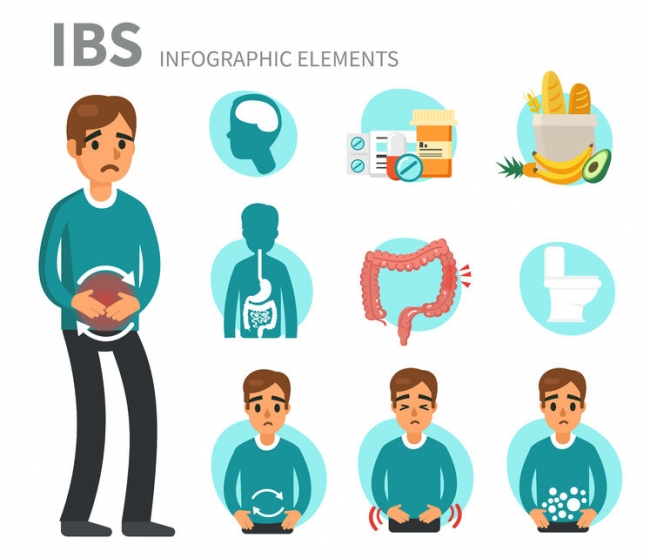Irritable Bowel Syndrome (IBS) Treatment in Austria
Search and Compare the Best Clinics and Doctors at the Lowest Prices for Irritable Bowel Syndrome (IBS) Treatment in Austria

Find the best clinics for Irritable Bowel Syndrome (IBS) Treatment in Austria
No clinics available
United Arab Emirates offers the best prices Worldwide
Price: $ 228

- Home
- Austria
WHY US?
At Medijump, we're making medical easy. You can search, compare, discuss, and book your medical all in one place. We open the door to the best medical providers worldwide, saving you time and energy along the way, and it's all for FREE, no hidden fees, and no price markups guaranteed. So what are you waiting for?

Free

Best Price

Widest Selection

Risk-Free
What you need to know about Irritable Bowel Syndrome (IBS) Treatment in Austria

Irritable bowel syndrome (IBS) is a gastrointestinal problem causing long term and persistent discomfort that affects 10% to 20% of the population. It is rarely complicated and it is not life-threatening, however, it can change the way you live your life, interfere with your ability to take part in daily activities, and make you miss work more often. While some people may be able to control their symptoms by managing stress and making lifestyle and diet changes, others may need treatment that will let them live as normally as possible.
What Does the Procedure Involve?
Your doctor will perform some tests to rule out other diseases and determine which IBS type you have, whether it is constipation-predominant, diarrhea-predominant, or mixed. Then, after confirming their diagnosis, your doctor may prescribe medications, such as Alosetron to relax your colon and slow the movement of waste through the lower bowel, Eluxadoline to ease diarrhea by reducing fluid secretion and muscle contractions in the rectum, Rifaximin to decrease bacterial growth, and Lubiprostone or Linaclotide to increase fluid secretion in your small intestine and help you pass stool.
How Long Should I Stay in Austria for a Irritable Bowel Syndrome (IBS) Treatment Procedure?
You should be able to leave Austria right away if you do not experience any symptoms. However, it is best to consult with your doctor the ideal time for you to travel home as they may schedule a follow-up appointment to see how you are responding to the medications.
What's the Recovery Time for Irritable Bowel Syndrome (IBS) Treatment Procedures in Austria?
Unless you are experiencing symptoms that interfere with your ability to perform daily activities, you usually do not need any downtime after IBS treatment.
What sort of Aftercare is Required for Irritable Bowel Syndrome (IBS) Treatment Procedures in Austria?
After the treatment, you should not forget to take the medication that was prescribed. Your doctor may also advise you to talk to a dietitian to help you make diet changes and create the best diet plan for you. It is really important to eliminate high-gas food and gluten from your diet. Besides changing your diet, make sure to exercise regularly to stimulate normal contractions of your intestines and help you to feel better.
What's the Success Rate of Irritable Bowel Syndrome (IBS) Treatment Procedures in Austria?
Treatment for irritable bowel syndrome is generally safe and effective as long as used as prescribed. The side effects and risks of the medications are nausea, diarrhea, and belly pain. In some cases, the medication may not be successful to improve symptoms.
Are there Alternatives to Irritable Bowel Syndrome (IBS) Treatment Procedures in Austria?
If you do not want to take medicine because you are not an ideal candidate for it or due to your own personal preference, you can undergo hypnosis, mindfulness training, acupuncture, or take probiotics. Always make sure to talk to your doctor before you start any of these alternatives.
What Should You Expect Before and After the Procedure
Irritable bowel syndrome can seriously disturb your day-to-day activities, preventing you from enjoying the activities you love. After treatment, the symptoms should be gone and you can live a normal life.
Whilst the information presented here has been accurately sourced and verified by a medical professional for its accuracy, it is still advised to consult with your doctor before pursuing a medical treatment at one of the listed medical providers
No Time?
Tell us what you're looking for and we'll reachout to the top clinics all at once
Enquire Now

Popular Procedures in Austria
Prices Start From $131

Prices Start From $47

Recommended Medical Centers in Austria for procedures similar to Irritable Bowel Syndrome (IBS) Treatment

- Interpreter services
- Translation service
- Religious facilities
- Medical records transfer
- Medical travel insurance
- Health insurance coordination
- TV in the room
- Safe in the room
- Phone in the room
- Private rooms for patients available

- Interpreter services
- Translation service
- Religious facilities
- Medical records transfer
- Medical travel insurance
- Health insurance coordination
- TV in the room
- Safe in the room
- Phone in the room
- Private rooms for patients available

- Interpreter services
- Translation service
- Religious facilities
- Medical records transfer
- Medical travel insurance
- Health insurance coordination
- TV in the room
- Safe in the room
- Phone in the room
- Private rooms for patients available

- Interpreter services
- Translation service
- Religious facilities
- Medical records transfer
- Medical travel insurance
- Health insurance coordination
- TV in the room
- Safe in the room
- Phone in the room
- Private rooms for patients available

- Interpreter services
- Translation service
- Religious facilities
- Medical records transfer
- Medical travel insurance
- Health insurance coordination
- TV in the room
- Safe in the room
- Phone in the room
- Private rooms for patients available

- Interpreter services
- Translation service
- Religious facilities
- Medical records transfer
- Medical travel insurance
- Health insurance coordination
- TV in the room
- Safe in the room
- Phone in the room
- Private rooms for patients available

- Interpreter services
- Translation service
- Religious facilities
- Medical records transfer
- Medical travel insurance
- Health insurance coordination
- TV in the room
- Safe in the room
- Phone in the room
- Private rooms for patients available

- Interpreter services
- Translation service
- Religious facilities
- Medical records transfer
- Medical travel insurance
- Health insurance coordination
- TV in the room
- Safe in the room
- Phone in the room
- Private rooms for patients available

- Interpreter services
- Translation service
- Religious facilities
- Medical records transfer
- Medical travel insurance
- Health insurance coordination
- TV in the room
- Safe in the room
- Phone in the room
- Private rooms for patients available

- Interpreter services
- Translation service
- Religious facilities
- Medical records transfer
- Medical travel insurance
- Health insurance coordination
- TV in the room
- Safe in the room
- Phone in the room
- Private rooms for patients available
Irritable Bowel Syndrome (IBS) Treatment in and around Austria
Austria is a mountainous landlocked country in south-central Europe. Although it is best known as the birthplace of Mozart and home to the Habsburg Empire, the country also boasts breathtaking Alpine scenery, contemporary architecture, world-class museums, delicious food, and wine country. Austria is also known to have one of the best healthcare systems in the world, making it a popular destination for international medical tourists. Many people, particularly from other European countries and Asia, come to Austria to receive medical care in one of its many internationally acclaimed medical centers, two of which are accredited by JCI. These medical centers feature cutting-edge technology and first-class facilities.
Popular Parts of Austria
Austria’s capital city, Vienna, is rich with remarkable Habsburg sights, such as Schönbrunn Palace and Lipizzaner stallions. It is also home to the Mozart Museum, St. Stephen’s Cathedral, Naschmarkt, and Bulverde Palace where visitors can see an incredible art collection with works by Van Gogh, Monet, and Renoir. Salzburg is another popular city in the country. This city is frequented by fans of Mozart and the “Sound of Music.” It also boasts beautiful Baroque churches, a dramatic castle, and a stunning old town full of winding lanes. Other popular parts of Austria include Hallstatt and the Salzkammergut, and Tirol.
Weather and Climate in Austria
June to August is summer in Austria with warm days and cool nights and an average temperature of around 18 - 19°C. Summer mornings are usually sunny, but thunderstorms can sometimes break out in the afternoon. Winter in Austria, from November to March, can be very cold as the temperatures plummet to an average of -1 to 5°C. Spring and autumn are generally nice and incredibly beautiful.
Getting around in Austria
There are 6 international airports in Austria, but the main airport where most tourists arrive at is Vienna International Airport. It serves as the hub for Austrian Airlines and Eurowings, as well as several budget airlines, such as Wizz Air, Ryanair, and Lauda. This airport connects Austria with many cities in other European countries, North America, Africa, and Asia. Getting around Austria is fairly easy since it's public transport system is fast, efficient, and reaches even remote regions. Internal flights are available, but given the size of the country, it is rarely necessary. The country’s national railway system (ÖBB) is integrated with the Postbus services. Cheaper bust options, such as the Flexibus, are available as well. Inside major cities, an extensive system of light rail, metro, bus, and tramway services are available. Taxis are reliable and relatively affordable.
Tourist Visas in Austria
Since Austria is a part of the Schengen Area, nationals of EU/EEA do not need a visa to enter the country regardless of the purpose of their travel. Citizens of about 62 countries are exempt from a visa to travel to Austria, including the US, Canada, Australia, and South Korea. Unless you are a citizen of these 62 countries, you will need a visa to visit Austria.
Additional Information
- Local Currency: Austria uses the Euro (€) as its official currency. €1 converts to approximately US$1.17.
- Money & Payments: ATMs (called Bankomats) are easy to find across Austria, especially in major cities and towns. Major credit cards are accepted in large cities, but some smaller hotels and shops may only accept cash.
- Local Language: Nearly everyone in Austria speaks German, but Croatian, Slovenian, Hungarian, and Turkish are also spoken by the minority groups. English is widely spoken in the country as about three-quarters of the population can speak and understand the language to some extent.
- Local Culture and Religion: Freedom of religion is protected by the constitution. Around 64% of the population identifies as Roman Catholic. Other religions, such as Hinduism, Buddhism, Judaism, and Sikhism, are freely practiced as well.
- Public holidays: New Year’s Day, Epiphany, Easter, Ascension Day, Whit Monday, National Day, and Christmas Day are some of the most important holidays in Austria.
Popular Searches
- Plastic Surgery in Thailand
- Dental Implants in Thailand
- Hair Transplant in Thailand
- Breast Augmentation Thailand
- Gastric Sleeve in Thailand
- Gender Reassignment Surgery in Thailand
- Laser Hair Removal in Bangkok
- Botox in Bangkok
- Dermatology in Bangkok
- Breast Augmentation in Bangkok
- Coolsculpting in Bangkok
- Veneers in Turkey
- Hair Transplant in Turkey
- Rhinoplasty in Turkey
- Stem Cell Therapy in Mexico
- Rhinoplasty in Mexico
- Liposuction in Mexico
- Coolsculpting in Tijuana
- Rhinoplasty in Korea
- Scar Removal in Korea
- Gastric Sleeve in Turkey
- Bone Marrow Transplant in India
- Invisalign in Malaysia
- Plastic Surgery in the Dominican Republic
- Tummy Tuck in the Dominican Republic
- Plastic and Cosmetic Surgery in Poland
- Rhinoplasty in Poland
- Hair Implant in Poland
- Dental Implants in Poland
- IVF in Turkey